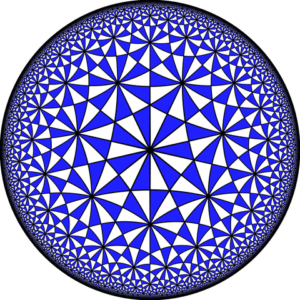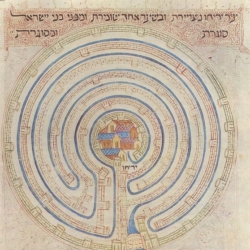| Acrostic Initials (Hebrew) | Source (Hebrew) | Contribute a translation |
|---|---|---|
אב״ג ית״ץ |
אַדִירְיַרוֹן בַהִירְיָרוֹן גְבִירְיַרוֹן יִגְבָּהְיָה תְּלַמְיָה צְתַנְיָה | |
קר״ע שט״ן |
קְרַמְיָה רְגַרְיָה עַדִירְיָה שְׁגַנְיָה טְלַטְיָה נְהַרְיָה | |
נג״ד יכ״ש |
נִשְׁמַרְיָה גְעַרְיָה דוֹהַרְיָה יְעַלְיָה כַסְיָה שִׁיגְיוֹנָה | |
בט״ר צת״ג |
(פ)בוֹעֶלְיָה טוֹרֶדְיָה רַמְיָא צַצְצִיָה (נְ)תְּהַבְהִיָה גַלְגַלְיָה | |
חק״ב טנ״ע |
חַנַנְיָה קָתְקַיָה בְּהַוְ־הוֹוַיָה [טַוְטַהְיָה (עַ)נְגְנִיָה עַמְמָיָה] | |
יג״ל פז״ק |
יְדָל־שַׂרְיָה גוֹרְרְיַה לְמֵימַרְיָה פְּקוֹדְקַדְיָה זוֹהָר־זְהַרְיַה קַוֹוְלַיָה | |
שק״ו צי״ת |
שַׁתְהוֹדַרְיָה קְדוֹשְיָה וְהַאֵלְ־אִלְיָה צַעְדֵיָה יָהְ־הַרְיָה תַּמְתִילְיָה | |
והיה ניהויה חוֹנַנְיָה קַתְקַיָה וְהָאֵל־אִלְיָה וָיְהוַה יה׃ בָּרוּךְ שֵׁם כְּבוֹד מַלְכוּתוֹ לְעוֹלָם וָעֶד: |
This is a litany of angelic names recorded in Sefer HaPeliah, an anonymous ḳabbalistic work first printed in the late 18th century. The sequence of letters in the 42 letter name is also provided in well-known piyyutim, including Ana B’Khoaḥ. Another formulation, very similar, can be found in Sefer haQanah. The transcription above relies largely on the manuscript held in the British Library, Or 2672 f.81v (dated 1562). Text in brackets is “out of place” by a line, according to the common formulation of the 42 letter name, which may indicate either a scribal error or perhaps an intentional error, given the importance of this litany. Letters in parentheses also differ from the roshei tevot expected and are followed by the letters as printed in the 1884 Premislany edition. The Premislany edition begins “Adiryarots Bahiryarots” indicating some confusion whether the the suffix for these names is a tsadi sofit or a nun sofit as indicated in the list recorded in Sefer haQanah. Or 2672 clearly shows a nun-sofit, and we have corrected our transcription likewise.
For more on the 42 letter divine name and the piyyutim, including Ana B’Khoaḥ, which provide it as an acrostic, please enjoy Ben Newman’s article, here. Concerning this text, Rabbi Newman writes:
The general genre of piyyutim or texts containing the 42 letter name as an acrostic is first seen, albeit in a magical and philosophical manner, in Sefer HaKanah (attributed to Nehunia b. Hakanah)….in Sefer Peliah, the author claims that the letters of the name of 42 actually correspond to the names of angels: “Now listen to these things for these letters of the name of 42, out of each letter comes an active angel from the power of the name…”[1] ספר הקנה- ד”ה סוד של מ”ב אותיות: Though the list of these names cited in Sefer HaKanah is not a piyyut, it could be thought of as a sort of text….In this, the first reference to the name of 42 from Sefer HaKanah, the name becomes a series of rashi teivot for the names of angels. The order of the names is also not exactly the same as in the conventional name of 42. It is the same in the beginning bit ends up being quite different, with many yods, vavs and hehs thrown in. Also, it seems to go way beyond 42 words….Sefer Peliah also begins by citing a similar list of angels that correspond to the letters of the name….Following this […] Sefer Peliah recounts a piyyut which it recommends saying instead of the name itself….It is quite likely, as stated above, that this piyyut in Sefer Peliah is the first instance of a prayer being written based on the name of 42. My research is by no means exhaustive, however, I have not come across a piyyut written based on the name of 42 in any text which predate Sefer Peliah. Now that we have found a probable source for this practice, let us turn briefly to a discussion of the significance of this divine name. In another section of Sefer Peliah it equates every six letter unit with one of the planets. It puts forth the idea that each six letter unit is able to draw extraordinary power to the individual from the planet to which it corresponds:
המ״ב אותיות היוצאים מהם אב״ג ית״ץ ושאר הו׳ שמות תמצאו כל כחות של ז׳ כוכבי לכת איך מתפשטים עליהם הכוחות מכח שם יהו״ה וי״ס ומכח שם בן מ״ב והם ראשי פרקים. וכאשר תחפוש במקרא תמצא לכ״א וא׳ פסוקים מן התורה והם הם ראשי פרקים של הכוחות ויהיו תמיד לעיניך ובהם יודע כל עתיד בשם יהו״ה אדנ״י יתברך ויתעלה:אב״ג ית״ץ רקיע שבתי שבתי וארצו. ושמטתו ויובל יום אחד. עין ימין. וחיים. ימים. שבת. חודש:
קר״ע שט״ן רקיע צדק. צדק וארצו, ושמטתו ויובל יום שני. עין שמאל, ושלום. ימים. שבת. חודש:
נג״ד יכ״ש רקיע מאדים. מאדים וארצו. ושמטתו ויובל יום ג׳. אוזן ימין. וחכמה. ימים. שבת. חדש:
בט״ר צת״ג רקיע חמה. חמה וארצו. ושמטתו ויובל יום ד׳. אוזן שמאל. וחן. ימים. שבת. חדש:
חק״ב טנ״ע רקיע נוגה. נוגה וארצו. ושמטתו ויובל יום ה׳. נחיר ימין. ועושר. ימים. שבת. חדש:
יג״ל פז״ק רקיע כוכב. כוכב וארצו. ושמטתו ויובל יום ו׳. נחיר שמאל. וזרע. ימים. שבת. חדש:
שק״ו צי״ת רקיע לבנה. לבנה וארצו. ושמטתו. ויובל יום שביעי. פה. וממשלה. ימים. שבת. חדש:[2] ספר הפליאה – ד״ה המליך אות ת׳ מבג״ד כפר״תIt would seem from this passage from Sefer Peliah that the reason recital of the name was considered a dangerous enterprise was because it drew down such extraordinary power. We see here also the division of the name of 42 into 7 six letter words. This theme is continues throughout later literature discussing the meaning of the name. As stated before, this 6 times 7 numerical division is probably the reason that Ana be-Koach came to be recited on Shabbat as well as on the Omer.
Sources
Jewish Virtual Library writes, “Sefer ha-Peliyah was published twice, in 1784 in Koretz and in 1884 in Premislany.” Note the differences between Or 2672 (1562) and the 1884 Premislany edition.


“אַדִירְיַרוֹן בַהִירְיַרוֹן | Adiryaron Ḅahiryaron, a litany of angelic names associated with the 42 letter name, recorded in Sefer haPeliah” is shared through the Open Siddur Project with a Creative Commons Attribution-ShareAlike 4.0 International copyleft license.











Leave a Reply